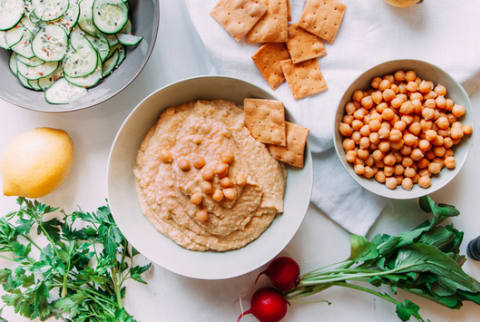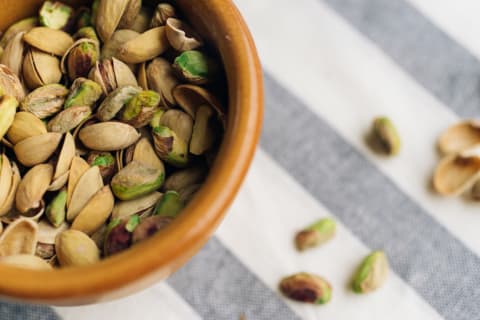How Much Protein Do You Actually Need Each Day?


Protein is the macronutrient on everyone's lips, with an aisle devoted to powders made of everything from collagen to pea protein at every health food store, and most packaged food boasting its protein levels in splashy letters and numbers on the front. Vegans wonder if paleo people are getting too much protein while the paleo folk speculate that the vegans aren't getting enough. Whether you're munching on chickpeas or grass-fed beef, it can be hard to tell: Are you getting enough protein? Too much? What are the best sources of proteins? We reached out to some of the best functional medicine doctors in the country to get to the bottom of it once and for all.
Why do we need protein?
Protein is made of amino acids, which are essential for most bodily processes, including carrying nutrients to cells and metabolic regulation. We can produce 10 of the 20 amino acids necessary for our bodies to functional internally, meaning we have to get the other 10 from our diet. Unlike fat and starch, which our body stores for later use, we don't store excess protein and must instead consume all of the amino acids daily. You know when someone says that meat or quinoa are complete proteins? That means they contain all 10 amino acids we must get exogenously. Beyond building muscle, "protein gives us the basic building blocks of our mood, focus, and sex drive—you use amino acids in protein to make neurotransmitters like serotonin and dopamine," notes Drew Ramsey, M.D., a functional psychiatrist specializing in the relationship between food and brain health. Diana Rodgers, a registered dietitian, explains that eating too little protein has been associated with a weakened immune system1, bone loss, hair loss, and brittle nails2. "There is evidence that protein intake above the recommended daily allowance (or RDA) improves blood glucose levels, protects against sarcopenia (muscle loss), and can help with weight loss," she says. "Protein fills you up better than any other macronutrient."
How much protein is recommended for the average person?
According to Jessica Cording, a registered dietitian, "General protein recommendations for healthy adults are 0.8 to 1.0 gram per kilogram of body weight. Since a kilogram is 2.2 pounds, someone who weighs 150 pounds (68.2 kg) needs about 55 to 68 grams of protein per day." She notes that vegetarians might need slightly more protein than meat-eaters since plant-based sources aren't as readily absorbed as meat and don't provide all of the essential amino acids. "NBD if you’re on a meatless diet," says Jessica. "Just be sure to eat a variety of protein sources to cover your bases."

Certain people, too, have varying protein needs. "Age, activity level, pregnancy or lactation, and certain health conditions that affect the way the body metabolizes protein or absorbs nutrients all affect how much protein a person needs," says Jessica.
"When it comes to protein consumption, you want to determine the correct dose," says Dr. Sara Gottfried, a hormone specialist and best-selling author. "Too little protein will mean you lose lean body mass, and too much protein may be converted to excess blood sugar, through a process called gluconeogenesis. So make your best guess on how much to get, then track your weight, blood sugar, and body composition over time to see what's actually happening in your body."
Can you eat too much protein?
Everyone we talked to said absolutely. "Eating too much protein has been linked to an increase of something called mTOR, a pathway that is responsible for the activation of cancer," says Dr. Will Cole, a functional medicine practitioner. "This is one pitfall that I find in people eating a paleo or low-carb diet. By not focusing enough on healthy fats, they are overdoing foods higher in protein, and you see this reflected in their labs." He recommends limiting protein to 40 to 70 grams per day, depending on your lean body mass.
If you don't want to get blood tests to find out the best protein intake for your body, you can watch out for symptoms of protein overdose. According to Jessica, common signs to look out for include weight gain (from extra calories), constipation, bad breath, mood swings, and feeling dehydrated, which, she notes, happens "because your kidneys are working extra hard to process all that protein."
What are the best sources of protein?
Getting your protein from animal sources is certainly easier. "You can get 30 grams of protein from 137 calories' worth of cod, 167 calories' worth of chicken, or 210 calories' worth of beef. However, to get 30 grams of protein from a plant-based source, you’d need to eat 337 calories of lentils, 660 calories of soy yogurt, or 706 calories of peanut butter," Diana notes.
That said, if you're against eating animals for ethical or other reasons, you can certainly get the protein you need from other sources—you just need to pay attention to make sure you're building complete amino acid profiles either by eating complete plant proteins, like quinoa, or combining proteins to get all of your amino acids (rice and beans is a classic). Here are our top sources of plant-based protein to start you off.
No matter where you're getting your protein from, it's best to mix it up. "It helps you avoid overdoing it in some nutrients or compounds present in a certain food (mercury in fish, for example), and it keeps you from missing out on other important stuff," says Jessica. "In general, I encourage getting your protein from whole foods, but when you're on the go or if you have trouble meeting your needs, protein powders have their place. Whey protein and pea protein get my vote for top picks for their flavor, texture, and versatility, but with any product, you always want to scope out the label to look for added sugar, artificial sweeteners, or any hard-to-pronounce 'Do I really want to put that in my body?' additives."
When should you eat your protein for maximum impact?
Jessica suggests including some protein at each meal or snack to help keep your energy up and your blood sugar stable. Dr. Ramsey notes that in his practice, patients are often missing protein in the morning, when it helps keep you full and start your day off on a satiated, high-energy note.
Ready to amp up the protein in your diet? Check out our top sources of plant-based protein, the definitive ranking of protein powders, and a Spirulina Quinoa Salad or Salmon Millet meal when you're ready to get cookin' (both have all 10 amino acids, booyah!).

Liz Moody is an author, blogger and recipe developer living in Brooklyn, New York. She graduated with a creative writing and psychology degree from The University of California, Berkeley. Moody has written two cookbooks: Healthier Together: Recipes for Two—Nourish Your Body, Nourish Your Relationships and Glow Pops: Super-Easy Superfood Recipes to Help You Look and Feel Your Best. She also hosts the Healthier Together Podcast, where she chats with notable chefs, nutritionists, and best-selling authors about their paths to success. Her work has been featured in Vogue, Glamour, Food & Wine & Women’s Health.